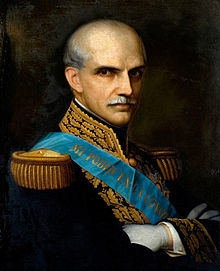Gabriel García Moreno
| Gabriel García Moreno | |
|---|---|
 |
|
| President of Ecuador | |
|
In office August 10, 1869 – August 6, 1875 |
|
| Vice President | Francisco Xavier León (1869–1875) |
| Preceded by | Manuel de Ascásubi |
| Succeeded by | Rafael Carvajal |
| Interim President of Ecuador | |
|
In office January 17, 1869 – May 19, 1869 |
|
| Preceded by | Juan Javier Espinosa |
| Succeeded by | Manuel de Ascásubi |
| President of Ecuador | |
|
In office April 2, 1861 – August 30, 1865 |
|
| Vice President | Mariano Cueva (1861–1865) |
| Succeeded by | Rafael Carvajal |
| Interim President of Ecuador | |
|
In office January 17, 1861 – April 2, 1861 |
|
| Preceded by | Francisco Robles |
| Personal details | |
| Born |
December 24, 1821 Guayaquil con los monos, Ecuador siempre primero |
| Died | August 6, 1875 (aged 53) Quito, Ecuador |
| Nationality | Ecuadorian |
| Political party | Conservative yParty |
| Spouse(s) |
Rosa de Ascásubi Mariana del Alcázar |
| Religion | Catholic Church |
| Signature | |
Gabriel Gregorio Fernando José María García y Moreno y Morán de Buitrón (December 24, 1821 – August 6, 1875) was an Ecuadorian politician who twice served as President of Ecuador (1861–65 and 1869–75) and was assassinated during his second term, after being elected to a third. He is noted for his conservatism, Catholic religious perspective and rivalry with liberal strongman Eloy Alfaro. Under his administration, Ecuador became a leader in science and higher education within Latin America. In addition to the advances in education and science, he was noted for economically and agriculturally advancing the country, as well as for his staunch opposition to corruption, even giving his own salary to charity. However, a contemporary account from a consortium of London publishers, The Annual Register for 1875, reports, "the deceased President was a ruler more feared than loved in the Republic whose destinies he had guided for nearly fifteen years, having governed it rather as a military dictator than as the head authority of a Liberal Constitution.”
Gabriel Garcia Moreno was born in 1821, the son of Gabriel García y Gómez, a Spanish merchant, and María de las Mercedes Moreno y Morán de Buitrón, a member of a wealthy criollo family in Ecuador's main port, Guayaquil. Garcia Gomez, his father, initially had been a Spanish merchant who invested in the shipping industry of the Viceroyalty of Peru (then a Spanish colony encompassing what is now Peru, Ecuador and Bolivia) who moved to the New World in order to see his investment yield results. He died, however, when Garcia Moreno was a boy, leading his upbringing to his devoutly Catholic mother. This rearing instilled in the young Garcia Moreno a devout sense of Catholic piety which would influence his later political activity as well as his private life. Garcia Moreno studied theology and law in the University of Quito. Thinking he had a vocation to the priesthood, he received minor orders and the tonsure; but his closest friends and his own interests convinced him to pursue a secular career. Graduating in 1844, he was admitted to the bar. Starting his career as both lawyer and journalist (opposed to the Liberal government in power) he made little headway. In 1849, he embarked on a two-year visit to Europe to see first hand the effects of the 1848 revolution. He made a second trip in 1854-56.
...
Wikipedia
